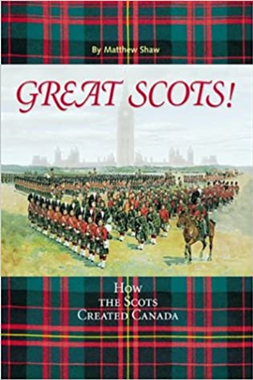Great Scots! How the Scots Created Canada
Matthew Shaw – 2003 Heartland Associates, Inc. Winnipeg, Manitoba
Wow. Where to start? This extraordinary little book (218 pages) is most certainly a must read for anyone interested in the role the Scots, and therefore likely their own ancestors, played in the development of Canada as an independent nation on the world stage. I could tell you lots about what this book meant to me but perhaps the best way to do so is in the author’s own words. Here, in defence of the bold claim of the book’s title, the author begins the Introduction with the following:
At first glance, the title of this book might seem exaggerated, even outlandish. After all, didn’t other ethnic groups contribute enormously to building Canada? The answer, of course, is yes. No one can deny that First Nations, the French, and the English had a huge hand in nation building. Moreover, Ukrainians, Chinese, Italians and Germans, as well as countless other ethnic groups also made significant contributions. Why, then, focus on the history of the Scots in Canada to explain Canadian values, culture and identity?
Good question!
From the beginnings of immigration into what we now call Canada the Scots have differed from other groups in a number of important ways. First, Scottish immigrants spread themselves relatively evenly throughout the upper half of North America, unlike other immigrant groups, which often tended to gather in limited geographic pockets. Second, the Scots kept coming and coming……..and coming. Unlike, say the Irish, who arrived in British North America primarily between 1820 and 1870, Scots have poured into the area in wave after wave since 1702. Thus, for three centuries, what we now know as Canada received a constant infusion of ideas and attitudes from Scotland. Finally, individual Scots, far more than from any other immigration group, have aggressively initiated growth and development and placed themselves in positions of power, controlling and influencing key institutions at critical points in the development of the Canadian Nation. The ubiquity, dominance and range of their accomplishments are truly astonishing.
Nine pages later the Introduction concludes with this paragraph:
The various factors, as described above, combined to make the Scots in Canada a dynamic and inexorable force. It’s no surprise, perhaps, that Scots controlled the fur trade, Canada’s first large scale commercial enterprise, which set the stage for modern commercial society. Scottish adventurers mapped out the country and laid the foundation for future settlement. Scottish politicians, including Canada’s fist two Prime Ministers, eight out of ten Fathers of Confederation, and many provincial Premiers, steered Canada’s early growth and development and bent the country to their will. Scots dominated commerce, including heavy industry, banking and merchandizing. In fact, three quarters of commercial capital in the nineteenth century was firmly controlled by Scottish magnates. Scottish teachers and academics established educational institutions, including Canada’s first universities, along Scottish lines and led Canada’s education revolution. In fields such as the arts, the military, science, the labour movement, and the media, Scottish hegemony and influence are no less impressive. When we actually examine the vast range of Scottish achievements in Canada, the title of this book may not seem so outlandish after all. In a very real sense, the Scots did have a disproportionately large hand in creating our country. Their ubiquity in every field of endeavour, the surprising extent of their power and influence, and their lasting impact on Canadian society and culture are truly one of the great and largely unexplored chapters in the story of Canada.
Piqued your interest? Following the Introduction are nine chapters that fully explain the facts. I appreciated that these were well footnoted and not just presented as romantic urban legends:
- Blueprint for a Nation
- Shaping the Political Landscape
- The Military
- Scottish Settlements
- The Birth of Banking
- A Revolution in Transportation
- Universities
- Literature
- Conclusion
Spoiler alert! The conclusion is outstanding. I repeat the assertion that this compelling reading for the Canadian Scottish diaspora. Cultural historians and nationalists in Scotland will likely feel an understandable sense of pride as well. In either case I hope you enjoy this fascinating little book as much as I have.
Wayne MacGregor Parker
